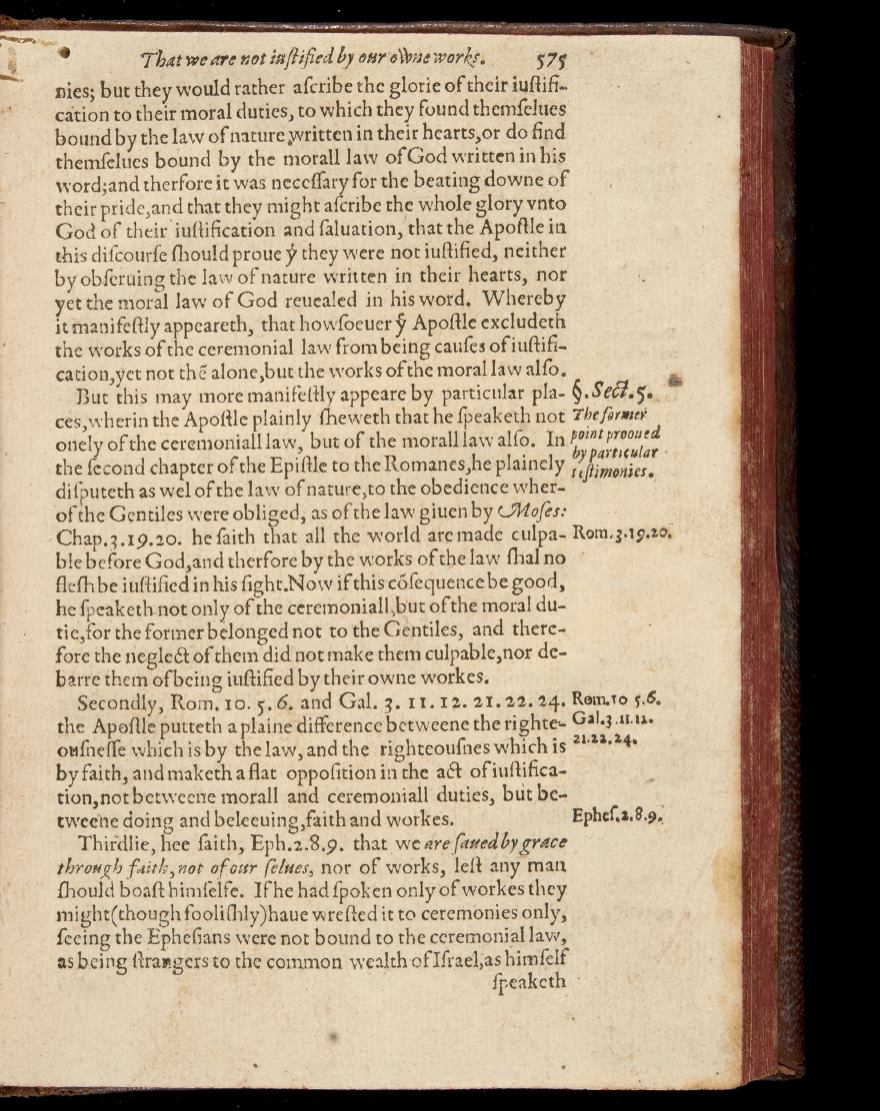

That
we
are
not ix
f
ifi
ed
t
y
oasr
ollme
words.
57Ç
nies;
but
they would rather
afcribe
the
glorie
of
their
iuftifi-
cátion
to
their moral duties, to which they
found themfelues
bound
by
the law
of
nature
pritten
in
their hearts,or
do find
themfelues
bound by the
morall law
ofGod
written
in
his
tNord;and
therfore
it
was
neccfhary
for
the
beating downe
of
their pride,and that
they
might
afcribe
the whole
glory vnto
God
of
their
iuftification and
faluation,
that
the Apoftle
in
this
difcourfe
mould
proue
ÿ
they were
not
iuttified,
neither
by obfcruing the
law
of
nature
written
in
their hearts, nor
yet
the moral law
of
God
reuealed in
his
word.
Whereby
it
manifeftly
appeareth,
that
howfoeuer ÿ Apoflle excludeth
the
works
ofthe
ceremonial
law
from
being
caufes
ofiuttifi-
cation,yet not
the alone,but
the works
ofthe
moral law
alto.
But
this may more manifeftly appeare
by
particular pla- §.Sec7.5.
ces,wherin the
Apoftle plainly fhe
veth
that
he fpeaketh
not
The
firmer'
onely
of
the
ceremoniall law,
but
of
the morall
law allo.
In
point prow'
td
by
the
fecond chapter
of
the Epiftle
to
the Romanes
he
plainely
P
Y
reftimoaier.
di
fputeth
as
wel
of
the law
ofnature,to
the
obedience
wher-
ofthe
Gentiles
were
obliged,
as
ofthe
law giuen
by
C.frtof
s:
Chap.3.19.2o.
he faith
that
all
the
world
are
made
culpa-
Rom.3.t9.zo .
ble
before
God,and
therfore
by
the
works
ofthe
law
Thal
no
flefh be iuflified
in
his
fight.Now
if
this cöfequence
be
good,
he fpeaketh
not
only
of
the
ceremoniall,but
ofthe
moral
du-
tic,for
the
former belonged
not to
the
Gentiles,
and
there-
fore the negle&
of
them did not
make them culpable,nor
de-
barre
them
ofbeing
iuftified
by their
ovine
workes.
Secondly, Rom.
1
o.
5.6.
and
Gal.
3.
i
I.
r
2.
21.22.24.
Rom.TO
5.6.
the
Apofile
putteth
a
plaine difference
betweene the
righter
64311.11.
otafüeffe
which
is
by the law,
and
the righteoufnes which
is
21.Z2.14'
by faith,
and maketh
a
flat
oppofition
in the
aé
of
iuftifica-
tion,notbetwecne
morali and
ceremoniall duties,
but be-
tweene
doing
and
bekeuing,faith
and workes.
Ephef
z.8.9
Thirdlie,
hee
faith,
Eph.2.8.9. that
we
are faseedbygrace
through faith
,rot
of
of
r
(elues,
nor
of
works,
left any
man
thould
boafl
hiFnielfe.
If
he
had fpoken
only
of
workes
they
might(though
foolifhly)haue
wreí}ed
it
to
ceremonies
only,
fceing the
Ephefïans were
not bound to the
ceremonial
law,
as
being
firar_gers
to
the common
wealth oflfrael,as hirnfelf
fpeaketh

















